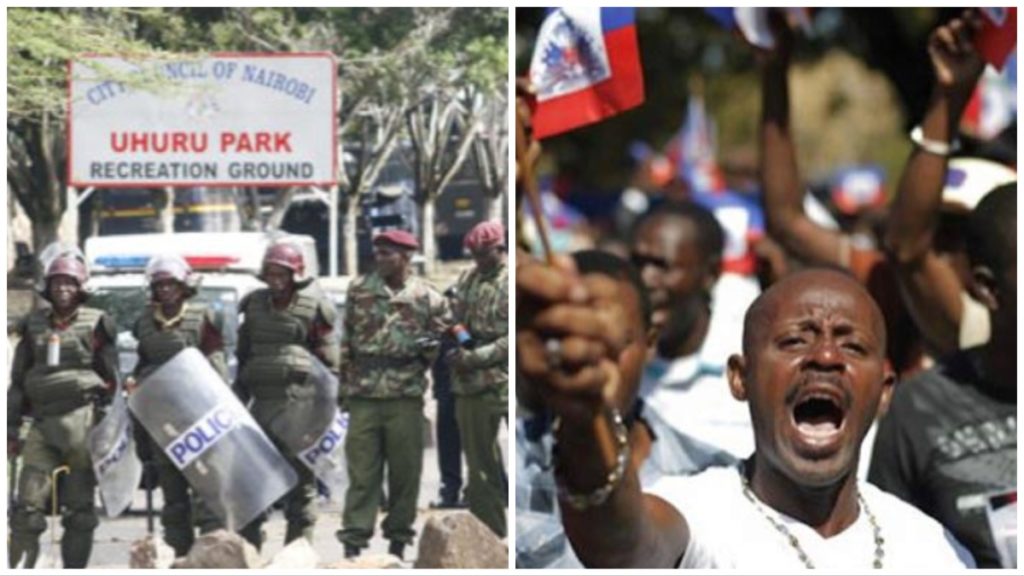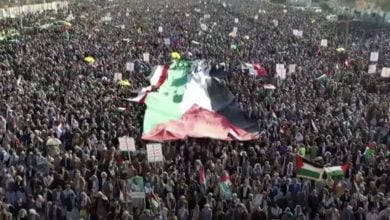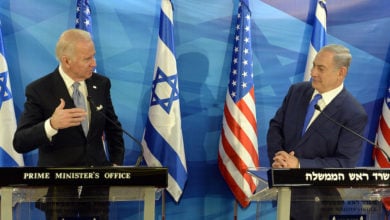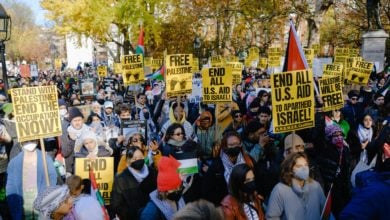On Oct. 3, the United Nations Security Council approved a U.S.-backed, 1,000-member Kenyan police force intervention to Haiti, ostensibly to fight gang violence. The 15 member council adopted a resolution, calculatedly drafted by the United States and Ecuador, which has authorized the so-called Multinational Security Support mission “to take all necessary measures” — a veiled wording for clear and approved use of unlimited force on the Haitian people in their own country by foreign agents.
China and Russia abstained from the vote. The senior U.S. diplomat Jeffrey DeLaurentis said with pride, “We have stepped up to create a new way of preserving global peace and security, answering the repeated calls of a member state facing a multi-dimensional crisis amid alarming spiraling gang violence.” (Reuters) This resolution is a manifestation of an occupation a few years in the making.
Last year, Haiti’s interim government officially requested an international deployment, garnering support from UN Secretary-General Antonio Guterres and the United States. Even though many countries had previously backed the prospect of sending what the UN has called a “specialized support force” to Haiti, before Kenya’s announcement, no country had stepped forward to lead the intervention.
Guterres with open arms took Kenya’s pledge, saying he “values Kenya’s consideration to possibly lead a non-UN multinational force,” according to UN spokesperson Farhan Haq.
Canada, which sent boots to Haiti earlier this year, had previously also pledged $75 million ($100 million Canadian) for Haiti’s police, also hailed Kenya’s offer. “We stand ready to work with Kenya and all partners to ensure the success of the upcoming reconnaissance mission and any subsequent possible deployment under UNSC mandate,” the Canadian ambassador to Haiti, Sebastien Carriere, said.
U.S. State Department spokesperson Matthew Miller told reporters that Washington, for its part, is “committed to finding the resources to support this multinational force.”
As we know, occupations and foreign invasions have been an ongoing part of Haiti’s history since its independence from France in 1804. Haiti has been plagued with numerous foreign interventions from imperialist forces of France, United States and Germany.
This interference with Haitian affairs has led to destabilization in the country. But there are no UN/U.S.-proposed solutions to the destruction put into motion covertly and overtly for centuries because of interventions like these. As detailed in Eugene Puryear’s analysis, “Haiti: between a rock and a revolution,” foreign military interventions and occupations have been “efforts to destroy the popular revolution spirit of the Haitian people who have faced 2 coups, 3 dictators, 2 foreign military occupations, multiple death squads, 4 straight dodgy elections since 2006, 1 presidential assassination,” and a range of exploitative trade deals that have led 5 million Haitians, half of the nation, to be in poverty, some finding alternative means to survive.
The Haitian people have every right to be apprehensive of this UN-backed task force because of how other UN interventions have played out in the nation. They have experienced nothing but failed “peace” deployments that have wreaked havoc in Haiti.
UN peacekeepers sent to the country after the 2010 earthquake were linked to a cholera outbreak that killed about 10,000 people. UN troops who withdrew from the country in 2019 were linked to sexual violence, not to mention numerous acts of racist hate crimes committed against Haitians by so called “peacekeepers.”
To be clear, there should not and cannot be a call for foreign intervention in Haiti from Haiti’s current administration of the U.S.-appointed Prime Minister Ariel Henry because by definition the administration is itself illegitimate.
Moreover, Haiti’s current unelected administration is considered by the majority of Haitians to be antagonistic to say the least. According to the Black Alliance for Peace, “the government is propped up only by Haiti’s de facto imperial rulers: the unseemly confederacy of the Core Group countries and organizations, as well as BINUH (the United Nations Integrated Office in Haiti), and a loose alliance of foreign corporations and local elites.” These proven historical imperialist bodies have caused financial strangulation, structural instability and stagnation in Haiti.
Not only are there proven concerns about the continued deployment of neo-colonist forces in Haiti- there are concerns over Kenya’s human rights record. Human rights groups argue that Kenya’s history of human rights abuses should have been evaluated before any consideration was made. Amnesty International Kenya has urged the UN and all concerned with human rights to investigate the “human rights and humanitarian implications of deploying an armed multinational force to Haiti.” (CNN) Kenya’s police have often been criticized for their violent approach towards “containing” demonstrations. Dozens of Kenyans have been killed during protests in just July of this year.
The UN expressed concern at that time about police brutality during the protests in Kenya — up to 23 people may have been killed during the demonstrations. The Kenyan police force, the same one that has been sent to Haiti, has been known to be corrupt and brutal.
Researcher Caleb Wafula of the Armed Conflict Location and Event Data Project also writes: “… the increasing police brutality in Kenya necessitates a thorough reassessment of the measures and tactics utilized by security agents.”
The Kenya National Civil Society Center has also opposed the deployment of the country’s police personnel to Haiti, accusing it of “extrajudicial killings.”
There is also the bigger piece, a cultural piece, i.e., language, context and history, which Kenyan security mostly won’t have. Kenyan professor and political analyst Herman Manyora told CNN that the language barrier and lack of knowledge of Haitian culture and history poses a threat to the Kenyan security forces. “They have their unique history, we don’t even understand that history,” making the intervention a “gamble.”
Haiti has solidarity from within Kenya itself from the Communist Party of Kenya. In a public statement, the Communist Party of Kenya writes: “The Communist Party of Kenya firmly rejects any form of neocolonialism and condemns attempts to use a Black face to brutalize Haiti or any other nation by the members of the Core Group, including representatives of the United Nations, Canada, France, Germany, Spain, the European Union, the United States, and the Organization of American States. The party recognizes the systems of maintaining a neo-colonial agenda in Haiti, or as dubbed in popular Haitian lingua, “Sistèm nan” (The System).
“We vehemently stand with the exploited Haitian population and oppose any western led interventions or involvement whatsoever in Haiti. By agreeing to send troops into Haiti, the Kenyan government is diminishing the sovereignty and self-determination of Haitian people, while preserving the neo-colonial interests of the United States, the Core Group and the United Nations. Imperialism, historically rooted in exploitation and subjugation, has caused immense suffering across continents. Similarly, the USA’s rise to power was significantly fueled by the enslavement of millions of African people, whose labor laid the foundation for its economic prosperity. The echoes of this dark past continue to resonate in various forms of systemic racial and social inequalities that persist in the USA today.
“… Our commitment lies in advocating for policies that uplift the marginalized and create a fair and just society, addressing root causes of societal issues, including land problems and the need for investment in industries to create jobs and improve lives … efforts to sabotage Haiti’s sovereignty, utilization of state instruments in the continual subjugation of the oppressed Haitian people and disruption of Pan-Africanism solidarity. We must therefore, intensify the struggle from below, emphasizing grassroots movements and collective action to bring about transformative change.”
While Haiti enters this phase of struggle that is taking on different faces, one thing continues to be true: The struggle for Haiti’s self determination, stability and dignity continues. Haiti needs solidarity and freedom from all imperialist chains — not a UN backed occupation in any form. From all oppressed people of the world: Long live a free, liberated Haiti! Down with all U.S./UN interventions in Haiti!







